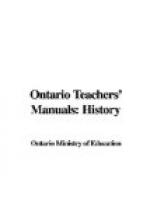NOTE: References to the discoveries made by Copernicus, Columbus, and the Cabots should be made. Pupils should read or hear short accounts of Erasmus, More, and Colet. A careful development of the causes and meaning of the movement should aid the pupils to anticipate its chief results.
It is assumed, of course,
that the study of this topic will occupy
several lesson periods.
THE FIGHT FOR CONSTITUTIONAL LIBERTY IN CANADA, 1759-1867.
In the struggle for constitutional liberty in British Canada, there are several distinct stages:
I. 1760 to 1763—Military Rule:
1. Amherst the
nominal governor; Canada divided into three
districts
2. Little disturbance of French customs; the habitants content
3. Influx of “old”
subjects—their character. (See Ontario
Public
School History of Canada,
p. 109; History of Canada, Lucas and
Egerton, Part II, pp.
4 and 7.)
II. 1763 to 1774 (Quebec Act):
1. Period of Civil Government under General Murray
2. Unrest owing to demands of the “old” subjects
3. Conditions of government:
(a)
Governor and Advisory Council of twelve all
appointed
by Crown
(b)
Assembly permitted but not feasible; depended
on
will of Governor
(c) British law, both civil and criminal, prevailed
(d) All money matters in hands of Council.
4. At this time
the French greatly outnumbered the British, and the
fear of the Revolution
of the American Colonies led to the French
being favoured in the
Quebec Act, 1774.
III. 1774 to 1791—Quebec Act to Constitutional Act:
1. Both “old”
and “new” subjects dissatisfied—the
French with
British Court procedure,
the British with French feudal customs.
2. Provisions of the Quebec Act:
(a) Change of boundaries (See text-book.)
(b)
Governor and Legislative Council appointed; no
assembly
called.
(c) French Civil Law; British Criminal Law
(d)
No oath required, as before, hostile to the Roman
Catholic
Church—beginning of religious liberty
(e) Legislative Council had no control of taxation
IV. 1791 to 1841—Constitutional Act to Act of Union Provisions of Constitutional Act:
1. Upper and Lower
Canada divided, because French and British could
not agree on many points.




